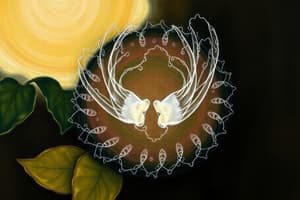Podcast
Questions and Answers
What does meiosis start with?
What does meiosis start with?
- Two diploid cells
- Four haploid cells
- One diploid cell (correct)
- One haploid cell
During what phase does a cell duplicate its chromosomes before meiosis?
During what phase does a cell duplicate its chromosomes before meiosis?
Interphase
During prophase I of meiosis, homologous chromosomes stick together in pairs.
During prophase I of meiosis, homologous chromosomes stick together in pairs.
True (A)
What is the correct order of events during meiosis?
What is the correct order of events during meiosis?
During which phase of meiosis does recombination occur?
During which phase of meiosis does recombination occur?
What is meiosis?
What is meiosis?
What is mitosis?
What is mitosis?
What are the four phases of mitosis?
What are the four phases of mitosis?
What is a diploid cell?
What is a diploid cell?
What is a haploid cell?
What is a haploid cell?
What are somatic cells?
What are somatic cells?
What is a gamete?
What is a gamete?
What are sister chromatids?
What are sister chromatids?
What are tetrads?
What are tetrads?
What is crossing over?
What is crossing over?
What are karyotypes?
What are karyotypes?
What are autosomes?
What are autosomes?
What is a sex chromosome?
What is a sex chromosome?
What is nondisjunction?
What is nondisjunction?
What is a mutation?
What is a mutation?
What are the four types of mutations?
What are the four types of mutations?
What are homologous chromosomes?
What are homologous chromosomes?
Flashcards
Meiosis
Meiosis
The process of cell division that produces four haploid daughter cells from a single diploid cell.
Interphase
Interphase
The phase of the cell cycle where chromosomes duplicate in preparation for meiosis.
Synapsis
Synapsis
The pairing of homologous chromosomes during prophase I of meiosis.
Crossing Over
Crossing Over
Signup and view all the flashcards
Meiosis Events
Meiosis Events
Signup and view all the flashcards
Diploid
Diploid
Signup and view all the flashcards
Haploid
Haploid
Signup and view all the flashcards
Somatic Cell
Somatic Cell
Signup and view all the flashcards
Gametes
Gametes
Signup and view all the flashcards
Sister Chromatids
Sister Chromatids
Signup and view all the flashcards
Tetrads
Tetrads
Signup and view all the flashcards
Nondisjunction
Nondisjunction
Signup and view all the flashcards
Mutation
Mutation
Signup and view all the flashcards
Deletion
Deletion
Signup and view all the flashcards
Duplication
Duplication
Signup and view all the flashcards
Inversion
Inversion
Signup and view all the flashcards
Translocation
Translocation
Signup and view all the flashcards
Karyotypes
Karyotypes
Signup and view all the flashcards
Homologous Chromosomes
Homologous Chromosomes
Signup and view all the flashcards
Autosomes
Autosomes
Signup and view all the flashcards
Sex Chromosomes
Sex Chromosomes
Signup and view all the flashcards
Study Notes
Meiosis Overview
- Meiosis produces four haploid cells from a single diploid cell.
- Purpose is to generate genetic diversity for sexually reproducing organisms.
Cellular Preparation
- Interphase is the phase when chromosomes duplicate in preparation for meiosis.
Prophase I Details
- Homologous chromosomes form pairs during prophase I.
- This stage includes the process of crossing over, where segments of nonsister chromatids exchange genetic material, increasing genetic variability.
Meiosis Events Sequence
- The sequence of meiosis events: prophase I, metaphase I, anaphase I, telophase I, cytokinesis, meiosis II.
Definitions of Key Terms
- Meiosis: The division of a diploid nucleus into four haploid daughter nuclei, producing gametes in reproductive organs.
- Mitosis: The process where a single nucleus divides into two genetically identical daughter nuclei, part of the mitotic (M) phase of the cell cycle.
Chromosome Types and Counts
- Diploid: Cells containing two homologous sets of chromosomes (2n); in humans, this is 46 chromosomes.
- Haploid: Cells with a single set of chromosomes (n); in humans, this is 23 chromosomes.
Cell Types
- Somatic Cells: Any cell in a multicellular organism excluding sperm and egg cells.
- Gametes: Haploid sex cells (sperm or egg) that unite during fertilization to form a zygote.
Chromatids and Structures
- Sister Chromatids: Identical copies of a duplicated chromosome.
- Tetrads: Paired homologous chromosomes consisting of two sister chromatids, formed during prophase I.
Genetic Mechanisms
- Crossing Over: The exchange of genetic segments between chromatids during prophase I, enhancing genetic diversity.
- Nondisjunction: An error in cell division where homologous chromosomes or sister chromatids fail to separate during anaphase.
Genetic Variation and Mutations
- Mutation: A change in the DNA nucleotide sequence; the ultimate source of genetic diversity in organisms.
- Types of mutations include:
- Deletion: Loss of a DNA segment.
- Duplication: An extra segment of DNA is added.
- Inversion: A segment breaks off and reattaches in reverse order.
- Translocation: A segment from one chromosome attaches to a different chromosome.
Chromosomes and Karyotypes
- Karyotypes: Displays of metaphase chromosomes arranged by size and centromere position.
- Homologous Chromosomes: Matched pairs of chromosomes in diploid cells, having the same genes at corresponding loci.
- Autosomes: Non-sex chromosomes that do not determine the organism's sex.
- Sex Chromosomes: Chromosomes that determine the sex of an individual (X and Y chromosomes).
Studying That Suits You
Use AI to generate personalized quizzes and flashcards to suit your learning preferences.




